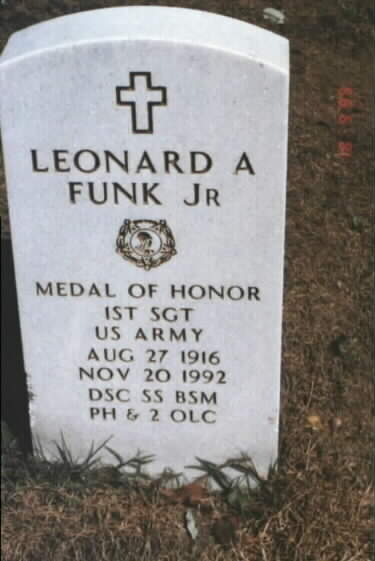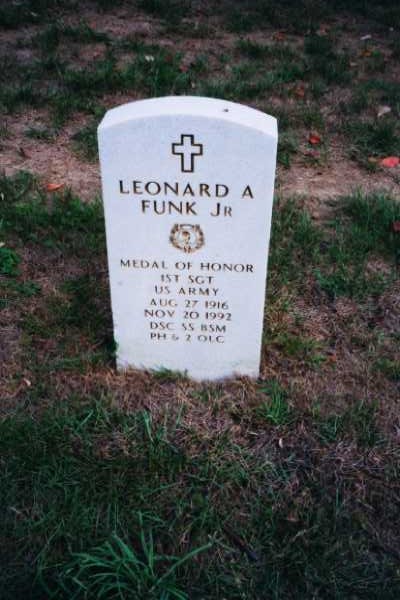Medal of Honor. Rank-Organization: First Sergeant, Company C, 508th Parachute Infantry, 82nd Airborne Division. Place-Date: Holzheim, Belgium, 29 January 1945. Entered Service: Wilkinsburg, Pennsylvania. Birth: Braddock Township, Pennsylvania. GO 75, 3 September 1945. Buried Friday November 27, 1992. Died of cancer November 20, 1992, at Braddock Hills, Pennsylvania, his hometown.
He enlisted in the Army in June 1941 at 21 years of age, and volunteered for airborne training. After earning his wings, he was assigned to Co C, 508th Parachute Infantry, Camp Blanding, Florida. He went with the 508th to England and was with unit when it became part of the 82nd Airborne Division.
He jumped into France with 82nd, June 6, 1944, during the Normandy Invasion and into Holland during Operation Market Garden, September 17, 1944.
His service with the airborne unit took him through Belgium, across the Rhine River in Germany, to the banks of Elbe River where the unit waited to enter Berlin as the war came to an end.
British and US soldiers were dropped into Holland during Market Garden in an attempt to secure bridges over the Rhine into Germany. It was here that the 5-foot 5-inch Funk earned Distinguished Service Cross for leading his men in an attack on enemy strong point. By beginning of Battle of the Bulge three months later, he was his company’s first sergeant. When the German army tried to break through Allied lines in Ardennes, Omar N. Bradley committed his only strategic reserves to stem the flow. That 2-Division force included 82nd Airborne, this time deployed by truck. It was after the German assault in the Ardennes was broken that he earned his Medal of Honor.
On January 29, 1945, he led a makeshift platoon of clerks in an assault against 15 German-occupied houses in Holzheim, Belgium. Wading into town in a driving snowstorm, the clerk platoon captured thirty Germans, while the rest of the unit captured 50 more and contained them all in yard of a nearby house. The platoon was under strength, and only four soldiers could be spared to guard prisoners until another company arrived to assume control. Funk and rest of platoon returned to the fight.
A short time later, after running into heavy resistance, he and another soldier returned to the house to retrieve soldiers left as guards. Assuming other paratroopers had arrived, slung his Tommy gun over his shoulder. Unknown to him, force of Germans, wearing white camouflage capes similar to those US wore, had overtaken the guards, released the prisoners and prepared them for an attack. When he walked into the yard, a Nazi officer covered him with a pistol and ordered him to surrender. Surrounded by 100 Germans with weapons pointed at the captured Americans, he pretended to surrender. Then whipped the weapon into a firing position and emptied full magazine into the officer. The other Germans returned his fire, killing the soldier who accompanied him. He reloaded his Tommy gun and resumed firing as the disarmed US soldiers seized weapons Germans had dropped and joined fight. In less than minute his force killed 21 Germans and wounded 24 more. The remainder were taken prisoner. He received the Medal of Honor at the White House in August 1945.
In addition to Medal of Honor and Distinguished Service Cross, he had earned the Silver Star, Bronze Star and 3 Purple Hearts. When he was discharged, he returned home to the job he held before war as a clerk. Two years later he went to work for the Veterans Administration, and he retired as a Division Chief in the Pittsburgh Regional Office in 1972.
His wife, Gertrude, joined about 100 people who braved the cold and wind to pay their last respects to the non-commissioned officer whose worse flaw was “he even liked and sometimes appreciated officers,” according to a member of Leonard A. Funk Association. A 3-man color guard from the 82nd Airborne Division carried unit flag in his honor.
“My name is not important,” said one association member at the burial service. “What is important is the final good-bye to a man who loved soldiers, privates, NCOs and yes, even officers. He loved people. He treated every soldier from private on up as if they were a four-star general.”
He was the sole surviving 82nd Airborne Division World War II Medal of Honor recipient.
He was discharged from Army in June 1945. His other medals included Distinguished Service Cross, Silver Star, Bronze Star, Purple Heart with 2 oak leaf clusters, the Good Conduct Medal, Presidential Unit Citation, American Defense Service Medal, European Theater of Operations Medal with Arrowhead and four Bronze Campaign Stars, Combat Infantry Badge, Parachutist Badge, Chevalier de L’Ordre de Leopole II Aves Palme, Croix de Guerre Avec Palme by the Belgium government, Belgian Fourragere, French Fourragere and Netherlands Orange Lanyard. Burial: November 27, 1992. Survivors include wife, Gertrude; 2 daughters, one brother; two grand-children; two great grandchildren and other relatives.
HARRISBURG, Pennsylvania, December 7, 1995: — A Congressional Medal of Honor awardee will have a stretch of Route 48 designated in his honor if legislation authored by State Senator Albert V. “Bud” Belan is adopted by the legislature and signed into law, the Senate Democratic Information Office announced today.
Belan (D-West Mifflin) said that his bill would identify the portion of Route 48 between Walnut Street in McKeesport and the intersection of Route 130 in Monroeville as the “Leonard A. Funk, Jr. Highway.” Funk was born in Braddock but lived on Hartman Street in McKeesport until his death two years ago.
“Leonard Funk was a bona fide war hero who deserves recognition for his efforts in the service to our country during World War II,” Belan said.
“Leonard Funk was responsible for saving many members of his outfit from capture or death at the hands of the Germans in January 1945.” During the drive to capture Holzheim, Belgium, Company C, 508th Parachute Regiment of the 82nd Airborne Division captured more than 80 German prisoners. Four members of the company were detailed to guard the prisoners while the remainder of the company cleared other pockets of resistance. The four American guards were subsequently overpowered by a larger German patrol. The German prisoners were freed and soon joined the rest of the patrol in beginning preparations to attack Company C from the rear. During the course of this activity, First Sergeant Leonard A. Funk, Jr. walked around a building and into their midst and was ordered to surrender. At this point, Sergeant Funk feigned surrender and instead turned his submachine gun on the German officer who was in command and the remainder of the nearby German soldiers. Simultaneously, Sergeant Funk shouted to his colleagues to seize the weapons and join the fight. In the ensuing battle, twenty-one Germans were killed, many others wounded and the rest captured. “Leonard Funk’s action in the face of the enemy was above and beyond the call of duty,” Belan said. “He showed limitless courage and a gallantry which should make all Americans, and in particular those of us who come from the Mon Valley, very proud.” Following World War II, Funk continued serving his country through his work with the Veterans Administration. Belan said that he was contacted by the Commander of the Military Order of the Purple Heart, Leroy Saylor, who is also a resident of McKeesport, about an appropriate memorial which notes Leonard Funk’s heroism. Under the legislation, the Department of transportation is required to erect and maintain appropriate signs which identify the designated portion of the highway as the Leonard A. Funk, Jr. Highway.
August 17, 1916-November 20, 1992. He now lies at rest in Arlington National Cemetery (Section 35, Grave 2373-4).
Michael Robert Patterson was born in Arlington and is the son of a former officer of the US Army. So it was no wonder that sooner or later his interests drew him to American history and especially to American military history. Many of his articles can be found on renowned portals like the New York Times, Washingtonpost or Wikipedia.
Reviewed by: Michael Howard


